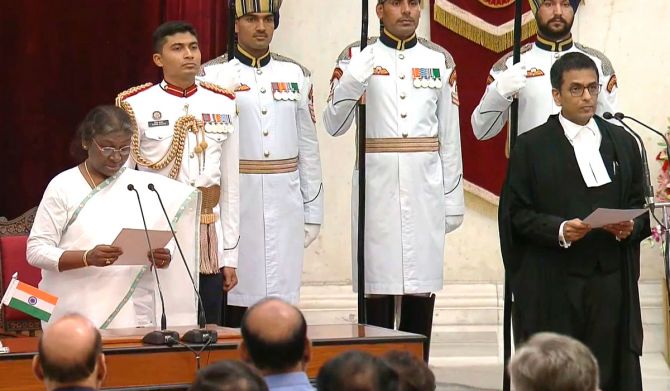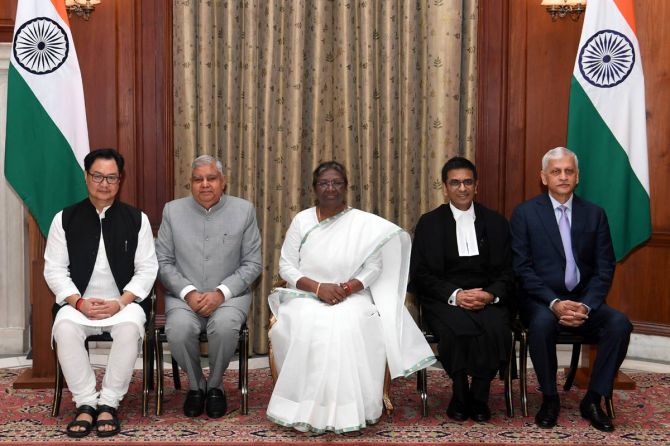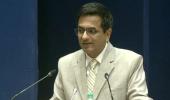Justice Dhananjaya Yashwant Chandrachud, who was part of the Supreme Court benches that delivered several landmark verdicts including the Ayodhya land dispute case, was sworn in as the 50th Chief Justice of India on Wednesday.

President Droupadi Murmu administered him the oath at a brief ceremony held at the Rashtrapati Bhavan. He took the oath in English and in the name of God.
Immediately after the swearing in ceremony at the Rastrapati Bhawan, the 50th CJI reached the Supreme Court premises and paid floral tributes to Mahatma Gandhi.
"Serving common people is my priority. Please look forward, I will work for all the citizens of the country. Be it in technology or be it in registry...or be it in judicial reforms, I will take care of citizens in every aspect," he said.
CJI Chandrachud said heading the Indian judiciary was a "great opportunity and responsibility".
In response to a query as to how he will ensure trust of people in judiciary, he said, "I will ensure trust of citizens not only through words but through my work".
Justice Chandrachud was sworn in as the 50th Chief Justice of India by President Droupadi Murmu.
Justice Chandrachud takes over as the head of India's Judiciary from Justice Uday Umesh Lalit, who demitted office on Tuesday.
Justice Chandrachud took over as the CJI from Justice Uday Umesh Lalit, who demitted office on Tuesday, and will head India's jJudiciary until November 10, 2024, a day before he completes 65 years.
Those present at the ceremony included Vice President and Rajya Sabha chairperson Jagdeep Dhankhar, Lok Sabha Speaker Om Birla, and Union ministers Rajnath Singh, Amit Shah and Kiren Rijiju.
Outgoing CJI Lalit was also present. On October 11, he had recommended Justice Chandrachud's name as his successor to the Centre.
On October 17, Justice Chandrachud was named the 50th CJI. He was elevated as a judge of the Supreme Court on May 13, 2016.
He is the son of the longest serving CJI Y V Chandrachud, who headed the Judiciary from February 22, 1978, to July 11, 1985.
Justice Chandrachud, who calls dissent the "safety valve of democracy", was part of several Constitution benches and landmark verdicts of the top court, including on matters relating to the Ayodhya land dispute and Right to Privacy.
He was also part of the benches that delivered path-breaking judgments on decriminalising same-sex relations after it partially struck down Section 377 of the Indian Penal Code, validity of the Aadhaar scheme and Sabarimala issue.
Recently, a bench headed by him expanded the scope of the Medical Termination of Pregnancy (MTP) Act and the corresponding rules to include unmarried women for abortion between 20-24 weeks of pregnancy.
A bench headed by him had also passed several directions to assuage people's miseries during the Covid-19 crisis, terming the brutal second wave of the pandemic last year a "national crisis".
Recently, Justice Chandrachud, as the senior-most judge after then CJI Lalit, was among the two judges of the apex court collegium who had objected to the method of "circulation" adopted for eliciting views of its members on the appointment of judges to the top court.

On September 30, a bench headed by him sat till 9:10 pm, around five hours beyond the regular working hours of the apex court, to hear 75 cases to clear the board before the onset of the Dussehra vacation.
In a landmark verdict delivered in February 2020, a bench headed by him had directed that women officers in the Army be granted permanent commission and command postings, rejecting the Centre's stand of their physiological limitations as being based on "sex stereotypes" and "gender discrimination against women".
Later, the bench had also paved the way for granting permanent commission to women officers in Indian Navy, saying a level-playing field ensures that women have the opportunity to overcome "histories of discrimination".
Justice Chandrachud, who has played a pivotal role in digitisation of the judiciary, has been part of several Constitution benches.
On November 9, 2019, the apex court in a unanimous verdict cleared the way for the construction of a Ram Temple at the disputed site in Ayodhya and directed the Centre to allot a five-acre plot to the Sunni Waqf Board for building a mosque.
Justice Chandrachud was part of the five-judge Constitution bench which dealt with that case.
He had written the lead judgment for a nine-judge Constitution bench in the Justice K S Puttaswamy versus Union of India case in which it was unanimously held that Right to Privacy constituted a fundamental right.
He was also part of a five-judge Constitution bench that unanimously decriminalised part of the 158-year-old colonial law under IPC section 377 which criminalises consensual "unnatural" sex between consenting adults, saying it violated the rights to equality.
In another five-judge bench, Justice Chandrachud in a unanimous verdict held IPC section 497, which criminalised adultery, unconstitutional on the ground of being arbitrary, archaic and violative of the Right to Equality and Privacy.
In a strong dissent, Justice Chandrachud differed with other members of a five-judge Constitution bench which, by a majority verdict, upheld the constitutional validity of Aadhaar.
He held the unique biometric identity number to be unconstitutional and violative of fundamental rights.
He had concurred with the majority verdict in the Sabarimala case in holding that the practice of prohibiting women of menstruating age from entering the temple was discriminatory and violative of women's fundamental rights.
Justice Chandrachud was designated as a senior advocate by the Bombay high court in June 1998 and became additional solicitor general in the same year till his appointment as a judge.
After completing BA Honours in Economics from St Stephen's College, New Delhi, Justice Chandrachud did his LLB from Campus Law Centre, Delhi University, and obtained LLM degree and a Doctorate in Juridical Sciences (SJD) from Harvard Law School, USA.
He practised law at the Supreme Court and the Bombay high court and was a visiting professor of comparative constitutional law at the University of Mumbai.











 © 2025
© 2025